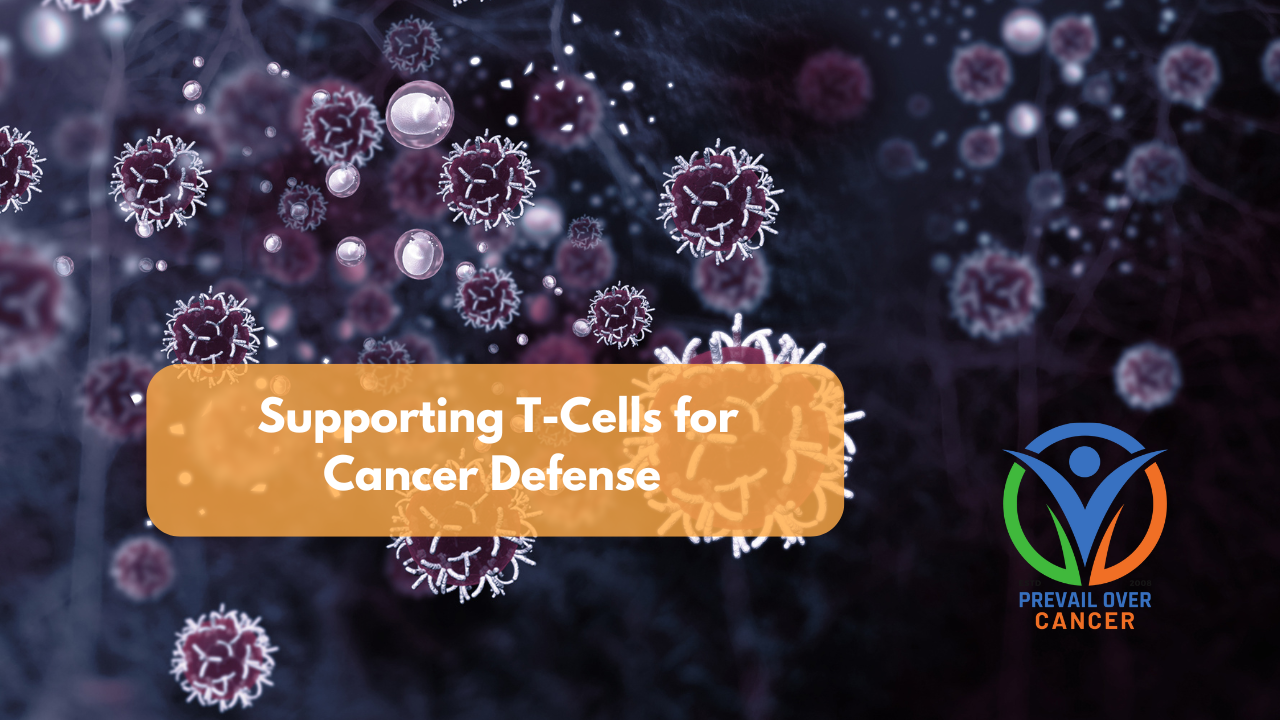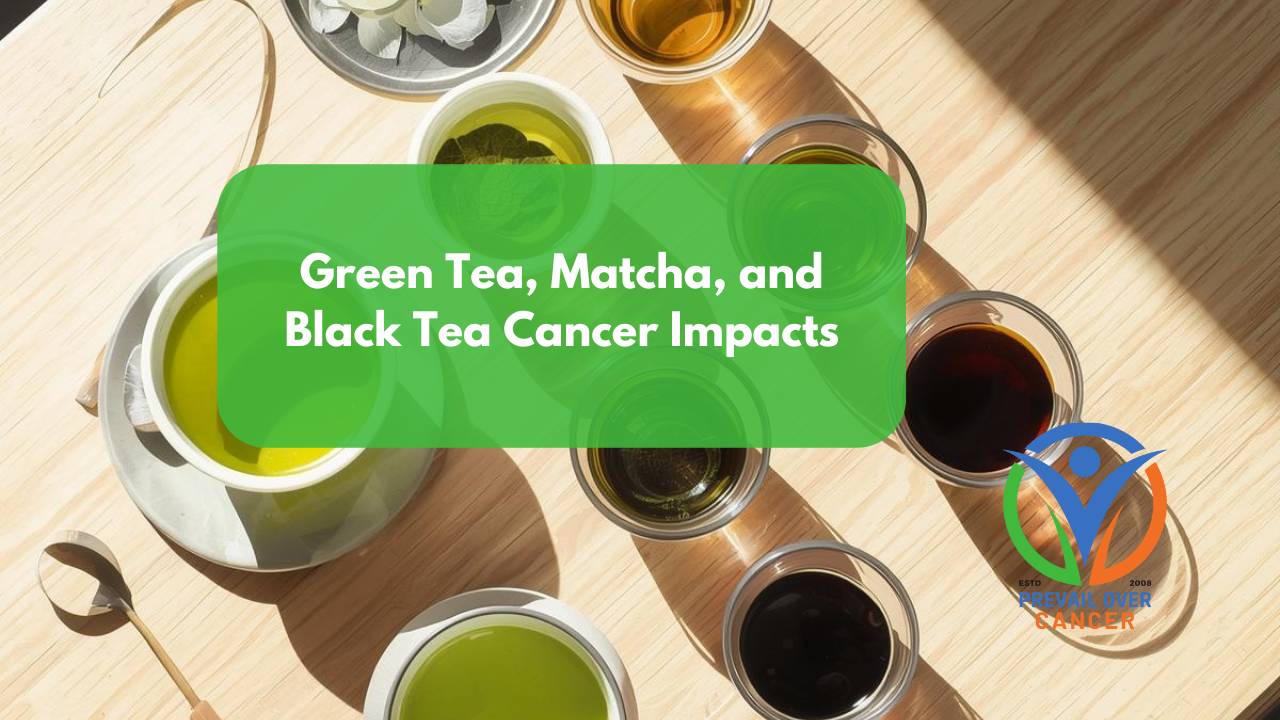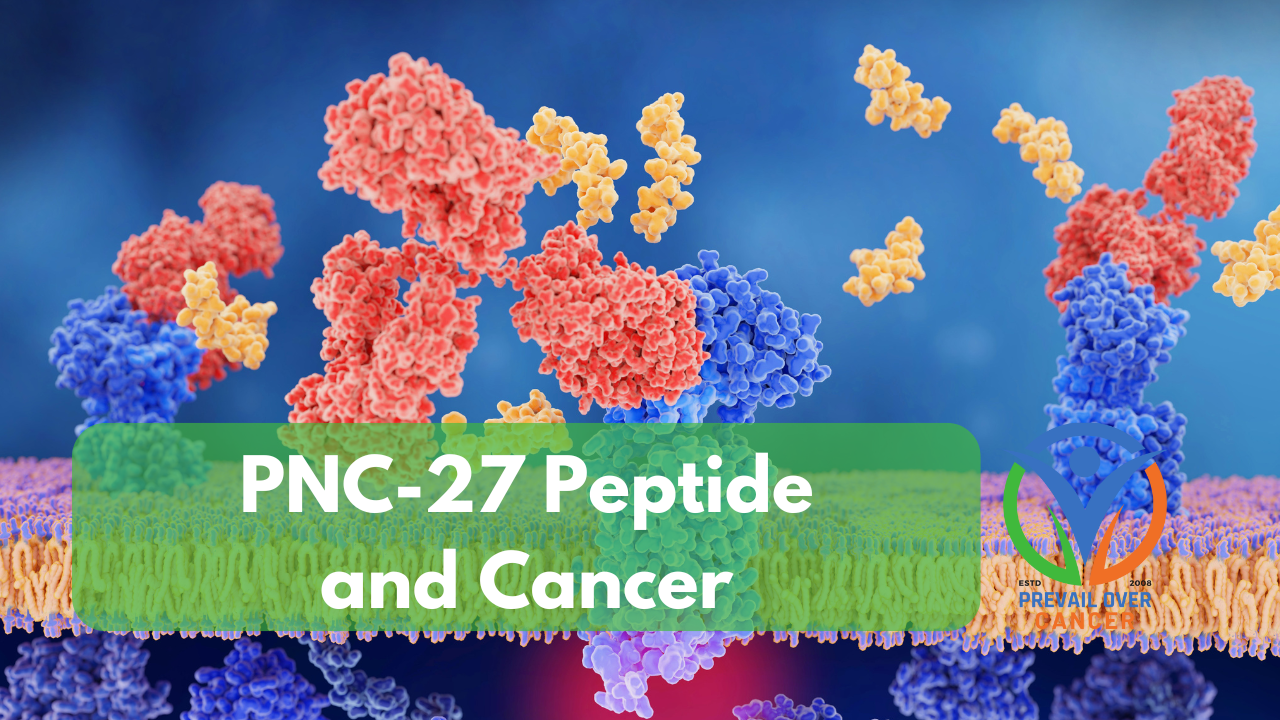T Cells: The Body’s Front Line Cancer Fighters — And How to Support Them Naturally

How T‑cells detect and destroy cancer cells, how immunotherapy strengthens them, and what lifestyle, nutrition, supplements, and repurposed medications may support healthy T‑cell function.
Researched and written by Keith Bishop, Integrative Cancer Educator, Cancer Coach, Clinical Nutritionist, Retired Pharmacist, and Founder of Prevail Over Cancer.
Why T‑Cells Matter More Than Ever in Cancer Defense
Over the last decade, T‑cells have become the centerpiece of modern cancer treatment. Immunotherapies such as checkpoint inhibitors, CAR T therapy, and cancer vaccines all work by activating or enhancing T cell function. This is because T‑cells are the immune system’s precision-guided assassins, capable of identifying and destroying cancer cells with extraordinary specificity.
A central review on T cells and cancer immunology emphasizes that T cells are the primary drivers of antitumor immunity, orchestrating both direct killing and broader immune coordination.[i] Without effective T‑ce...
Green Tea, Matcha, and Black Tea: Evidence-Backed Anticancer Benefits You Can Use Every Day

How Tea Polyphenols Support Cellular Health, Reduce Oxidative Stress, Counteract Damage from Processed Foods, and Reduce Cancer Risks
Tea is one of the most widely consumed beverages in the world—and one of the most researched. Green tea, matcha, and black tea all come from the Camellia sinensis plant, yet each offers unique anticancer benefits thanks to differences in processing, polyphenol content, and antioxidant potency.
For people with cancer and caregivers looking for simple, daily habits that support an anticancer lifestyle, tea is a powerful, evidence-supported place to start.
Smart Beverage Pairing Seminar Handout
Why Tea Matters for Cancer Prevention
Tea is rich in polyphenols, plant compounds that help protect cells from oxidative stress, inflammation, and DNA damage—three biological processes closely linked to cancer development.
The most studied polyphenols include:
- Catechins (especially EGCG) in green tea
- Theaflavins and thearubigins in black tea
- Concentrated c...
Healthy Holiday Foods for People with Cancer

An Evidence-Based, Empowering Holiday Cancer Food Guide
The holidays bring joy, connection, and celebration — but they can also bring stress around food, especially for people navigating cancer. Rich meals, sugary treats, and social pressure can leave you wondering:
“How can I enjoy the holidays without derailing my health?”
The truth is: you can enjoy festive meals while supporting your body’s healing terrain. With a few simple strategies, holiday foods can become nourishing, energizing, and deeply supportive of your well-being. BTW, you don't have to be perfect all the time!
Holiday Foods That Support Your Body During Cancer Treatment
Holiday meals naturally include many nutrient-dense foods that align with anticancer nutrition principles. The key is knowing which ones to lean into.
📖FREE: Seminar Handout Download: Healthy Holiday Foods for People with Cancer
Top Anticancer Holiday Foods
|
Food |
Key Nutrients |
Why It Helps |
|
Cranberries | ...
Do Binders Help Fight Cancer? Separating Hype from Evidence.
Exploring the claims, risks, and realities of binders in cancer care—from anecdotal buzz to scientific silence.
Researched and written by Keith Bishop, Integrative Cancer Educator, Cancer Coach, Clinical Nutritionist, Retired Pharmacist, and Founder of Prevail Over Cancer.
What Are “Binders” in Cancer Circles?
In integrative and alternative cancer communities, “binders” refer to substances that claim to “bind” toxins, heavy metals, microbial byproducts, or treatment-related metabolites in the gut. Popular examples include:
|
Binder Type |
Common Examples |
Claimed Function |
|
Clay-based |
Bentonite, zeolite |
Bind metals, mycotoxins |
|
Charcoal-based |
Activated charcoal |
Adsorb chemicals, reduce gas |
|
Fiber-based |
Psyllium, modified citrus pectin |
Trap bile acids, support detox |
|
Resin-based |
Cholestyramine |
Bind bile acids, reduce inflammation |
These are often promoted alongside repurposed drugs like ...
How Interferon Helps Your Body Fight Cancer

Foods, supplements, and lifestyle habits that support your immune system’s interferon natural defense.
Researched and written by Keith Bishop, Integrative Cancer Educator, Clinical Nutritionist, Cancer Coach, Retired Pharmacist, and Founder of Prevail Over Cancer.
What Is Interferon?
Interferons are natural proteins your body makes to help fight infections and abnormal cells—including cancer. They act like messengers, telling your immune system to wake up, attack, and clean up. There are three main types:
- Type I (IFN-α and IFN-β): These help stop cancer cells from growing and spreading.
- Type II (IFN-γ): This type activates immune cells to recognize and destroy cancer cells.
- Type III (IFN-λ): Mostly helps protect surfaces like your skin and gut, with growing interest in cancer research.
Interferons are so powerful that some cancer treatments use them directly or try to boost their effects.[i]
Foods That May Help Your Body Make More Interferon
Eating certain foods can suppor...
🍕Is Your Pizza Raising Your Cancer Risk?
Pizza’s dark side: burnt crust, processed meats, and blood sugar spikes can raise cancer risks—here’s what the science says.
Written by Keith Bishop, Integrative Cancer Educator, Clinical Nutritionist, Retired Pharmacist, and Founder of Prevail Over Cancer.
🔥Burnt Crust and Acrylamides: A Carcinogenic Combo?
When pizza crust is overcooked or charred, it can form acrylamides—chemical compounds linked to increased cancer risk. Acrylamides are especially prevalent in carbohydrate-rich foods cooked at high temperatures, such as baked goods and fried potatoes. Though research is ongoing, acrylamides are genotoxic (damage DNA) and carcinogenic in animal studies.
Additionally, the blackened edges of pizza crust may contain polycyclic aromatic hydrocarbons (PAHs) and heterocyclic amines (HCAs), both of which are formed during high-heat cooking and have been shown to damage DNA and promote cancer development.[i]
Learn more from the National Cancer Institute: Chemicals in Meat Cooked at ...
Does Cancer Thrive in an Acidic Body? What Urine and Saliva pH Reveal About Your Terrain
Exploring the Link Between pH Balance, Nutrient Buffering, and the Tumor Microenvironment
Researched and written by Keith Bishop, Clinical Nutritionist, Cancer Coach, Retired Pharmacist, and founder of Prevail Over Cancer.
Acidic Terrain: How pH Influences Cancer Risk and Progression
Cancer doesn’t grow in a vacuum—it thrives in environments shaped by metabolism, inflammation, and cellular stress. One of the most overlooked yet critical factors? pH balance. While blood pH is tightly regulated between 7.35 and 7.45, other body compartments, including the tumor microenvironment, can become significantly more acidic. This shift isn’t just a biochemical quirk; it may actively promote cancer growth, immune evasion, and treatment resistance.
Acidic Microenvironments and Cancer Progression
Cancer cells often rely on aerobic glycolysis (the Warburg effect), producing lactic acid even in the presence of oxygen. This leads to a localized drop in extracellular pH, often reaching 6.5–6.9 i...
PNC-27: The Peptide That Targets Cancer Cells Without Harming Healthy Tissue

Exploring the Mechanism, Promise, and Research Behind the Selective Anti-Cancer Agent PNC-27
Researched and written by Keith Bishop, Clinical Nutritionist, Cancer Coach, Retired Pharmacist, and Founder of Prevail Over Cancer
PNC-27 and Cancer Introduction
PNC-27 is an investigational anticancer peptide derived from the tumor suppressor protein p53. Unlike conventional chemotherapeutics that broadly target dividing cells, PNC-27 selectively binds to cancer cells expressing HDM-2 (also known as MDM2) on their outer membranes. This unique mechanism has sparked interest in its potential to induce rapid, necrotic cell death while sparing healthy tissue. Though not FDA-approved, PNC-27 represents a novel class of membrane-targeting peptides with implications for integrative oncology and terrain-based care.
PNC-27 Cancer Mechanism of Action
PNC-27 contains a p53-derived binding domain that targets HDM-2, a protein overexpressed on the surface of many cancer cells. Upon binding, PNC-27...
Zinc and Cancer: A Trace Mineral’s Expansive Role in Tumor Biology and Immune Defense
Evidence-Based Insights into Zinc’s Anticancer Mechanisms, Clinical Applications, Testing Methods, and Supplementation Strategies
Researched and written by Keith Bishop, Clinical Nutritionist, Cancer Coach, Retired Pharmacist, and Founder of Prevail Over Cancer
Zinc is an essential micronutrient that plays a crucial role in the metabolism of proteins, lipids, and nucleic acids, as well as in gene transcription. This micronutrient is critical for numerous physiological processes, including reproduction, immune function, and wound healing. At the cellular level, zinc is indispensable for the normal function of the immune system’s macrophages, neutrophils, natural killer cells, and the complement system. Zinc is a micronutrient, so it is not well stored in the body and has to be frequently replenished.
Zinc is an essential trace mineral involved in hundreds of biological processes that sustain cellular health, immune resilience, and metabolic balance. It serves as a cofactor for over 3...
Akkermansia and Cancer: How This Gut Bacteria Supports Chemo, Radiation, and Immunotherapy
Explore the science behind Akkermansia muciniphila—its role in cancer treatment, immune health, and how to support its function naturally.
Researched and written by Keith Bishop, Clinical Nutritionist, Cancer Coach, retired pharmacist, and founder of Prevail Over Cancer.
What is Akkermansia muciniphila?
Akkermansia muciniphila is a mucin-degrading bacterium that resides in the gut’s mucus layer. It plays a critical role in maintaining intestinal barrier integrity, improving immune responses, and influencing metabolic health. Its presence has been linked to improved outcomes in cancer therapy, metabolic disorders, and immune regulation.
A decline in Akkermansia muciniphila abundance correlated with the development of intestinal inflammation, colorectal cancer, and even cognitive disorders such as depression and anxiety.[i]
How Akkermansia Supports Cancer Treatments
- Akkermansia muciniphila and Chemotherapy: Enhancing Efficacy Through Microbial Synergy
Emerging evidence sugges...



